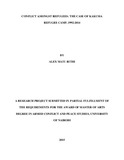| dc.description.abstract | This study focused on conflict amongst refuges. It looked at conflict amongst refugees at
Kakuma Refugee Camp in North Western Kenya and the attendant causes and impacts of the
conflict thereof. The study was limited in period and scope, to the area of Kakuma between 1992
when the camp was set up and 2014. Both primary and secondary sources of information and
data were relied on for this study. Primary sources were themselves mainly refugees residing in
the camp while secondary sources were internet and newspaper material, unpublished reports
and books and published works. The study was guided by the hypothesis that Kakuma has
witnessed conflicts amongst its refugees and conflict at Kakuma has impacted negatively on the
refugees. The theoretical framework for the study was Abraham Maslow‟s Basic Human Needs
Theory (BHN) whereby within the deficiency needs, the lower needs must be satisfied before
one can move to the next level of need. The study found that indeed there is widespread and
persistent conflict amongst the refugees which needs to be checked and curbed. It found that the
situation at Kakuma could be a time bomb, and that there is negative peace amongst the refugees
as exemplified by the occasional upsurges of violence, which occur at the slightest excuse. There
is tension between various ethnic groups and nationalities at Kakuma which is very dangerous
because it is presumed nearly everywhere, even in government circles that refugees in a refugee
camp have no business being guarded/safeguarded against infighting as they are “good people
fleeing from trouble in their land, and cannot afford to engage in farther trouble.” And indeed
this happened in the months of October and November, 2014, when an all-out war broke out
between refugees from Burundi and those from Sudan after a Burundian kid was knocked down
by a motor cyclist. It left 14 people dead and scores injured before the conflict was brought to an
end. The study recommends that the government should introduce a Refugee Protection Bill to
enact laws relating to the behaviour and activities of refugees once accommodated in any camp
or place within the country. This will ensure that these victims of trouble elsewhere do not again
get besieged and haunted or even killed in their newly found “peace haven.” Under the law it will be possible to flush out the criminally minded. The law will also put in place checks and balances to ensure that in the event of trouble amongst the refugees, the government machinery is able to rise to the occasion and contain the situation before things run out of hand. | en_US |

